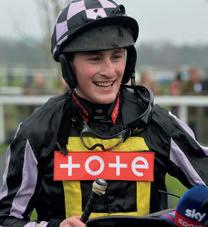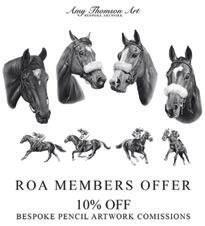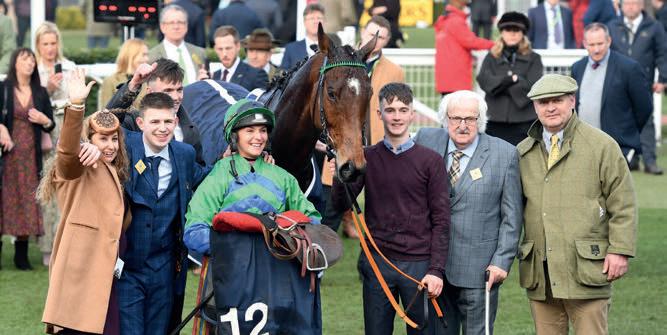
28 minute read
ROA Forum
A message to the membership
Dear owners,
During these challenging and uncertain times, I have been amazed and inspired by the spirit of owners and everyone else in the racing family. Pulling together and fi nding a way forward has been the overriding theme over the last few weeks and we must maintain that fi ghting spirit, to ensure that racing is in a position to thrive when this crisis is over.
Our industry has been severely impacted by the coronavirus pandemic. The resultant fi nancial pressures mean that racing’s suspension has threatened the livelihoods of people throughout this sport. As owners, you are the lifeblood of the industry and your continued individual support to horses, stable staff and trainers is invaluable. Together, our continued show of strength will help this industry survive during this diffi cult time.

Over the last few weeks, through virtual meetings covering issues ranging from hardship relief to resumption, I have seen fi rst-hand the constantly developing challenges this crisis is creating. Racing is in a precarious position and we should make no bones about the fact that the retention of owners and their horses, jobs, livelihoods and welfare standards, things we have worked so hard to build as an industry, are on the line.
Yet, given the circumstances in which we fi nd ourselves, I continue to see so much of what we all love about this sport and what has tied me for so long to this industry: a passion for horses and a will to fi ght and thrive.
In April, the industry agreed an unprecedented £22 million package of relief support for the most vulnerable people, businesses, and horses in our sport – a vital safety net to protect those most at risk. Our working groups came together and agreed a plan for the resumption of racing at exceptional speed, giving the industry some hope, which would enable money to start fl owing back through our sport.
As we continue our dialogue, there will undoubtedly be more to do to keep racing ticking over and ready for a return to action. That includes working with other sports to show exactly what we mean to people across the country.

The fragility of the situation can present frustrations and we are working hard to overcome them. We continue to ensure that the owners’ role in sustaining the sport is recognised. We want to do more, and are working hard, to protect and incentivise the number of horses in training. We want to see racing back across the country. This period has forced us to face harsh realities but it will not dissuade us from doing all we can for owners and the sport of racing.
There is a comforting reality to what the racing community stands for and how we do our bit for Britain. Racing contributes £4.1 billion to the UK economy and indirectly employs 85,000 people, playing a central role throughout rural communities across the country. Owners provide over £600m directly into the racing industry, which pays £275m in taxes to the Treasury.

Racing is important to Britain. Owners are important to racing. We can deliver for racing’s future, together.
Every day I see our stakeholder bodies working together, individual owners supporting their horses and trainers, and yards supporting their stable staff . It gives me increased confi dence that, as a community, we are doing our utmost for a sport we all love.
I look forward to the day when I can see you all on the racecourse again. Until then we will be working hard to ensure we have a sport to return to that can continue to prosper once Covid-19 has been defeated.

Yours faithfully,
Charlie Liverton ROA Chief Executive

Charlie Parker is new ROA President
Charlie Parker will succeed Nicholas Cooper as ROA President with effect from June 30.
Confirmation of the election in March will see Parker serve a three-year term as President, which follows two three-year terms after election to the ROA board in 2015. He has been closely involved with the work of the ROA business as Chairman of the Membership Committee and a member of the Audit Committee.
On his appointment Parker said: “I am honoured to have been elected as President of the ROA by my colleagues on the board.
“The ROA is a vital component within the British horseracing industry and I am determined to continue the outstanding work of Nicholas Cooper in not only keeping owners at the forefront of discussions and decision making, but also to help the wider industry bodies face up to the enormous challenges that we will face over the coming months.”
Chris Wright was elected last year for a three-year term as Vice-President.
The board recognised the contribution of Nicholas Cooper during his four-year term as President, which was extended
Charlie Parker: term as ROA President begins on June 30

by one year. Chief Executive Charlie Liverton said: “On behalf of the ROA board I would like to convey thanks and gratitude to Nicholas Cooper for his contribution to the board over the past seven years, and for his commitment over the past four years as ROA President.
“His leadership has been a constant during a period of evolution for the industry and the ROA has made significant strides during that time.”
ROA board election and AGM
Members showed significant interest in standing for election to the ROA board this year, with 15 candidates contesting three places.
Members are being sent details of voting, which will be available online for the first time this year.
The 15 candidates standing this year are: Mark Albon, Donald Clark, John Corsan, Simon Double, Colleen Ford-Ellis, Edward Goodwin, Amanda HamiltonFairley, Sam Hoskins (re-standing), Gay Kelleway, Mary Philpott, Ged Shields, Alan Spence (re-standing), Graham Triefus, Martin Warren and Randy Weeks.
New for this year, a security code will be sent by post to members, inviting them to vote online. Where we don’t hold an email address, voting details will be sent by post. To register your email address please email info@roa.co.uk.
The ROA AGM, which was scheduled to take place at York on June 30, has now been changed to an online event. Further details will be announced in due course.
REGISTER FOR UK VAT
It is now more important than ever to ensure that you are registered for UK VAT and reclaiming your VAT back under the ROA’s scheme. In this unprecedented time, it’s important to know that the VAT scheme can save you approximately £4,000 per horse per year excluding the VAT that can be reclaimed on the original purchase price of your racehorse.
The scheme was introduced in March 1993 and enables racehorse owners to recover UK VAT incurred on their racing expenses e.g. training fees, vets’ fees, keep fees, transport costs, 10% of your mobile phone and telephone bill.
To qualify you must be a registered owner with the BHA, have a horse in training and have a valid sponsorship contract registered with the BHA. As a member of the ROA you automatically qualify to join our sponsorship scheme, which is run in partnership with the Tote.
Owners’ silks sport a Tote logo and annually owners receive £100 plus VAT once registered with HMRC. For further details please email info@roa.co.uk.
Even if you own a share of less than 50%, you may be eligible to register for UK VAT with the other partners to validate a VAT registration of 50% or above – again if you have any questions please contact the ROA team at info@roa.co.uk.
Once registered, each owner submits quarterly VAT returns to HMRC, including all racing related income and expenditure. You can also continue to recover your racing related VAT when your racehorse is at rest, providing you intend to re-enter your horse into training the next season.
If you decide to retire your horse from racing, and recovered the VAT on the original purchase, then you will need to value the horse and declare the VAT to HMRC on this value at the point of retirement. If you decide to sell your racehorse please ensure you bill the purchaser with VAT and include your UK VAT number on any sales entries and invoices. If you forget to do this then the sales value could be deemed as VAT inclusive by HMRC.

HMRC now operates a making tax digital platform, and currently only VAT registrations above the HMRC VAT threshold (more than £85,000) must comply – however, the likelihood is that this will be extended to all VAT registrations in the future, and therefore it is worth looking at and researching digital packages to submit your quarterly VAT returns seamlessly.
Details of online packages can be found at https://www.roa.co.uk/ resource/help/mtd.html
Supporting racing’s participants
LEVY BOARD CEO ALAN DELMONTE ON HELPING THE SPORT DURING THE COVID-19 CRISIS
The Horserace Betting Levy Board collects a statutory levy based on the British horseracing business of bookmakers, including betting exchanges and pool betting operators. It receives no government grants and no National Lottery funding. Levy income is then distributed, focused on the improvement of horseracing, veterinary education and science and rare breeds.
There’s been no racing since just after the completion of the Cheltenham Festival in mid-March. Fixtures lost include Aintree’s Grand National meeting, the start of the Flat at Doncaster and Newmarket’s Craven meeting. What impact will this lack of racing have on the yield collected by HBLB?
Levy yield fluctuates depending on results but the last two years have averaged £90m, so that is £7.5m a month. From March 18 to the end of April, bearing in mind the Grand National meeting is a significant contributor, it’s somewhere in the region of £13m lost levy income.
Alan Delmonte: Levy Board will play an important part in restart arrangements

Can we say at this stage how prizemoney will be affected further down the line?
It is impossible to say with certainty. Much depends on when racing can resume, which will only be done when it is responsible and not against the policy of the government, and what the resultant betting activity is. We will need to be sure we do not overcommit in the short-term in what is an uncertain environment. But the Levy Board has a track record of giving a high priority to prize-money, by far our biggest heading of expenditure, and this will continue.
Do we know how much would be lost in revenue if, for example, Royal Ascot was cancelled?
As with the Grand National, Royal Ascot would be a significant contributor. Therefore June, which also includes the Derby meeting and a number of other significant fixtures, would, as with April, usually be a month with a higher than average levy yield.
Prize-money is just one of the areas funded by the levy collection. Could we see cuts to funding for veterinary science, education or other areas?
When racing was cancelled, we took early action to ensure that nonessential, discretionary expenditure by our grant recipients was minimised, so as to ensure we were preserving our funds. Necessary expenditure will continue to be funded by us and we have looked to reassure our recipients of this. Thinking beyond the short-term, it is undesirable to cut funding to projects midway through or where the Board has made a specific
Losing the Grand National meeting among other fixtures in April saw the Levy Board coffers take a significant hit GEORGE SELWYN

commitment. But everything will have to be looked at in the round. We will take evidenced-based decisions and will look to consult appropriately to ensure that our funding is distributed effectively across the sport.
Will HBLB advise the BHA on the revised racing programme/fixtures when racing starts in order to maximise levy yield?
Yes. We are represented on a number of different workstreams including the one dealing with the resumption of racing. The Levy Board will have to play a significant part in the restart arrangements and we must ensure we have kept back the resources to do this. The funding and scheduling of fixtures is interlinked, so we are working with racing’s organisations to ensure that we produce the right programme for the horse population, which will in turn provide competitive racing attractive to the public.
HBLB and the Racing Foundation have agreed a £22 million support package for racing. How did you decide which groups to help?
The BHA, Horsemen’s Group and RCA worked collaboratively on a funding package. The Levy Board and Racing Foundation joined meetings as appropriate. Broadly speaking, the package was divided Levy Board/ racecourses and Racing Foundation/ horses and people. A key aspect of the Levy Board’s package is that it will be advancing already approved grants and making loans available – this provides cash flow assistance to all racecourses. Crucially, it keeps back sufficient monies for us to fund a race programme with additional grants when fixtures resume.
We are continuing to provide grants for regulation and integrity expenditure, veterinary research, the racing schools’ training of stable staff and so on. We were making use of our reserves at around £2m a month, even before we provided extra help for the sport.
The value of racing to the rural economy stretches far beyond the industry’s direct participants. How closely is the Levy Board involved with DCMS and government advisers?
We are regularly speaking with DCMS, our sponsor government department, and through DCMS to other departments such as the Treasury. For the sport more generally, BHA leads on this for racing, though HBLB and BHA are in near-daily contact to ensure co-ordination and to exchange information.
What are the main challenges facing the industry when it starts to recover from the impact of the coronavirus pandemic?
Some of the most difficult will be the unexpected ones people haven’t yet thought of, because there won’t be a plan for those. The rest are going to be around protecting horse welfare and people welfare, businesses’ viability, keeping breeders and owners still active, the wider economy and the availability of cash for investment in ownership and other disposable income like racegoing and betting. There are also the issues of reorganising the Pattern, major races and bloodstock sales. The sport will need to work closely together with a common purpose and have patience in restoring itself.
From a Levy Board perspective, once racing is back on, it transforms our ability to help as income starts to flow. Once we are through that initial phase of resumption, the Levy Board will also have to consider how it rebuilds its reserves; with equine flu and coronavirus both bringing racing to a standstill in the last 14 months, it is essential that the Board finds a way to return to a position in which it is able to support the sport in future similar circumstances.
What message would you like to give to owners, trainers and racing’s participants at this time?
Practically, to take advantage of every government scheme that you can as a business or as an individual. The whole world is caught up in this storm and the first priority is to get shelter. It is unrealistic to say that the Levy Board can solve every problem, but we are recognising at the outset that there needs to be immediate and meaningful support for racing’s participants when fixtures resume, rather than saying that this can only be an afterthought. We are therefore working hard to ensure that any extra funding we provide before racing resumes is targeted and effective, so that we keep one eye on the future.
TRAVEL THE WORLD FROM HOME
At this time of the year we would usually have a busy diary of events for members to enjoy. While members are staying at home and keeping safe during the lockdown period, we thought it would be an opportunity to arrange a series of exclusive virtual tours, specifically designed for owners.
Our virtual tours will take you behind the scenes of studs, stables and racing facilities, not just in the UK but around the world, with expert commentary from those closest to the horses at the heart of the action.
We hope you’ll join us virtually from the safety of your homes for a visit over the coming weeks. Links will be emailed to members. Videos will be uploaded to YouTube and you can subscribe to the Racehorse Owners Association channel.

OWNERSHIP MATTERS: essential admin
Transfer of responsibility
Under the Rules of Racing, where a racehorse moves yards your trainer will be required to mark your horse(s) as being taken out of their care and control.
They will record where a horse is transferred to you as the owner. An email will be triggered to you via the Racing Admin website noting the date the horse left the care of the trainer and explaining the requirements of transfer of responsibility.
In accordance with equine antidoping rules, you will need to accept the transfer of responsibility. This can be done by logging in to racingadmin.co.uk in the ‘My Horses’ section.
If you don’t have your login, or have problems logging in, a Transfer of Responsible Person form will need to be completed. If necessary, a copy can be downloaded from britishhorseracing.com.
Third party liability scheme
During this very difficult time we are mindful that owners may have horses whose seasons have had to finish prematurely, or who will have been sent away from their trainers’ yards for a prolonged period of rest or turnout. We would remind members to check with the owners/proprietors of such premises that they have the requisite third party liability cover in place, for a minimum limit of indemnity of £2 million, but ideally for up to £5 million.
If your racehorse(s) normally return to your home or your own premises for their rest periods, or if you are intending to do this due to the exceptional current circumstances you should check your liability cover will extend to include these. Most household policies include domestic animals; whilst this may include leisure horses and ponies it may not include racehorses whilst resting.
Should you have any queries please use the link below to contact details for our insurance brokers Weatherbys Hamilton who will be happy to help: https://www.roa.co.uk/benefits/third.html
Bloodstock insurance
Owners who have insured against all risks of mortality might be due a partial refund (return of premium) if the use is reduced, perhaps while a jumps horse is temporarily out of training, or where a horse is sold/retired. It is worth checking with your insurers whether they will be
Owners are reminded of their responsibilities towards their horses in the current climate

making automatic readjustments for periods where horses’ seasons have been cut short unexpectedly.
Horses returning to racing
Owners are reminded of the following anti-doping regulations for horses that will return to racing: http://rules. britishhorseracing.com/#!/book/34/ chapter/s3457-anti-doping
Vaccination schedule
For the remainder of 2020, for a horse to be eligible to compete in Britain it will be necessary to have received an approved equine influenza vaccination within the last 12 months, instead of the existing nine-month requirement. The 12-month approach reflects the policy that was in place in Britain prior to 2019. For full details see www.britishhorseracing.com
Horses retiring from racing
Both owners and trainers (acting as an agent for the owner) are able to notify the BHA about the decision to retire a horse from racing through the Racing Admin website at www2.racingadmin. co.uk. The owner/trainer will be asked to confirm: • The reason for the horse’s retirement • Restrictions on racing in the future (non-racing agreement) • Details of the horse’s new keeper
Completion of the online form triggers the start of the permanent retirement process, which takes 14 days; after that date the horse is made ineligible to run and is no longer bound by the Rules of Racing.
It also triggers a notification to any new keeper, advising them that they are responsible for completing a transfer of ownership within 30 days. If the new keeper fails to do this, they may incur a fine of up to £5,000 from Trading Standards.
New owner details
Where the horse has a new owner, the new owner’s name, email address and postcode will need to be uploaded by the trainer/owner when giving notification of retirement through the Racing Admin website.
This information helps ensure the racing industry can identify and have the fullest possible traceability for those racehorses that have retired from the sport.
A dedicated page on the BHA’s website will allow participants to check the retirement status of any horse. This can be found at https://selim. britishhorseracing.com/padua/
Passports
To update ownership information online (for horses not in training) see weatherbysgsb.co.uk.
In the case of a horse that dies or is euthanised the passport must be returned to Weatherbys within 30 days, along with a note stating the date of death. Passports can be returned to the owner upon request.
Life after racing
BHA provides guidance around a racehorse’s life after racing: https:// www.britishhorseracing.com/regulation/ life-after-racing/
Retraining of Racehorses (RoR)
As British horseracing’s official charity for the welfare of retired racehorses, Retraining of Racehorses (RoR) places great value on improving traceability. In addition to meeting legal requirements in updating the passport, the owners of former racehorses should register their horse with RoR.
Initial registration is free, ensuring both ongoing traceability of where a horse is in retirement, and providing the new keeper with a support network. Registering for free includes the opportunity to benefit from the extensive programme of educational activities run by RoR. Last year over 300 educational events were available to those registered with RoR.
RoR also assists racing owners and trainers in rehoming and retraining their horses. The charity offers an advice line, the Source a Horse website facility and a retrainers’ directory.
RoR is awaiting funding to roll out a nationwide network of regional field officers who, once recruited, will be on the ground points of contact for owners and trainers. See www.ror.org.uk.
Central Equine Database
The Central Equine Database is used by equine Passport Issuing Organisations (PIOs) who upload passport records, and by regulatory bodies including DEFRA, the Devolved Administrations (for Scotland, Wales and Northern Ireland), the Food Standards Agency and Local Authority Trading Standards. Owners can register with the digital stable at https://www.equineregister. co.uk/home
News in brief
Racing2Learn
The BHA announced the launch of Racing2Learn in April, a new online e-learning platform for anyone involved with the racing and thoroughbred breeding industries. The platform, which has been developed over the last 12 months in collaboration with 1st4Sport Qualifications and the wider racing industry, aims to provide a range of flexible eLearning courses that can be accessed remotely.
Some courses are designed specifically for certain job roles within racing and breeding with more generic courses also available. It is free to use for a limited period and once registered most courses are free to access. Some of the areas covered include horse care, racehorse welfare and safeguarding.
There are also downloadable learning programmes and a calendar of learning and training events. Courses will be updated and new courses added on an ongoing basis. Each course contains interactive elements and certificates can be achieved which have continuous professional development (CPD) points applied by the Chartered Institute for the Management of Sport and Physical Activity.
Covid-19 resource
The ROA has been updating guidance for owners online through a dedicated Covid-19 resource at roa.co.uk, a weekly bulletin and social media updates. If you would like to receive ROA ebulletins, please email details to info@roa.co.uk.
Pencil portrait offer
At a time when many of our members may be missing seeing their horses, a beautiful portrait may be particularly welcome. Amy Thomson, equine artist, is offering members 10% off pencil portraits during the lockdown period. Amy works in graphite pencil to produce beautiful, realistic portraits of horses. Please see amythomsonart.co.uk/ artwork or email amythomsonart@ outlook.com.

Training agreement
For horses in training, where a variation in terms is agreed between you and your trainer get it confirmed in writing. A clearly written email will suffice. This will serve as an update to your training agreement, required under the Rules of Racing, 15, Trainer Code. The ROA / NTF training agreement can be found at roa.co.uk
Owner Breeder online
The April issue of Owner Breeder was mailed to all UK and Irish-based members of the ROA. In the difficult weeks of the Covid-19 pandemic we were aware that the magazine may be delayed or may not have reached members.
We therefore uploaded a digital version of Owner Breeder, hosted in the members’ area of the ROA website at roa.co.uk. This is part of a new service to ensure members can access the issue online.
Members based overseas will be sent details to view a digital version of the magazine as we were advised that any magazines sent overseas were not guaranteed to be processed or delivered. We have also uploaded all the previous issues of Owner Breeder from this year to the members’ area.
The magazine will continue to bring you news and features in these unprecedented times.
ROA’s new contact details
The ROA office has relocated from London to Reading. Our new phone number is 0118 338 5680, while the email address remains info@roa.co.uk. Our new postal address is Forbury Court, Forbury Road, Reading, Berkshire RG1 1SB.
MAGICAL MOMENTS The O’Sullivan families hit the heights at Cheltenham
The O’Sullivans: Francesca, Michael, Mikey, Maxine, Alan, Gerard and Eugene celebrate It Came To Pass’s Cheltenham Festival triumph

It came to pass. The Cheltenham Festival that is, though only just – four days after it had concluded, the BHA announced British racing was to be suspended due to the coronavirus.
It Came To Pass also happens to be the name of the longest-priced winner at this year’s meeting, the Foxhunter hero providing a fairytale family success for two different, unrelated clans of O’Sullivans.
The ten-year-old is trained by County Cork-based Eugene O’Sullivan and was partnered by daughter Maxine, carrying the silks of Alurie O’Sullivan, who watched on television at home in Manchester, with husband Gerard, daughter Francesca and grandson Michael all at Cheltenham.
While odds of 66-1 scream ‘surprise’, had he been trained by Willie Mullins or Gordon Elliott, his price would have been much shorter; indeed, as his owner points out: “Nobody seemed to realise that we’d beaten [the Mullinstrained 11-4 favourite] Billaway easily the previous spring – and On The Fringe the following month.”
Alurie O’Sullivan and her husband have been owners for 25 years, and
while she describes the Foxhunter triumph as “the icing on the cake”, there have been other magical moments, too, and It Came To Pass has few miles on the clock and hopefully can provide a few more.
“We’d always been interested in racing, and got into ownership through a business associate of Gerard’s who owned Forgive ‘N’ Forget,” says Alurie. “We got introduced to Ray Peacock, who said he had a horse in mind for us, who turned out to be Nuns Cone.
“He was our first horse and on his first start for us we had our first winner, at Uttoxeter. That got us going.”
While there is more to come for the owners, their association with the late trainer does provide a certain upto-date symmetry, given that he was to train in the shadow of Cleeve Hill, at Tenbury Wells, after moving from Malmesbury.
Other trainers for the O’Sullivans have included John O’Shea, George Moore, Patrick Haslam, Karen McLintock and Ian Williams.
They have always preferred jumps racing, though have had the odd Flat horse (My Fantasea won three times in Alurie’s colours), and one of their first was a Flat-bred and -raced performer who was bought to go hurdling, Red Valerian. A certain Frankie Dettori partnered him on debut for Ian Balding.
“He was a star,” recalls Alurie O’Sullivan. “He won six times for us, but sadly we lost him at Sedgefield when he struck into himself.
“We started off buying at the sales but went into breeding as well. Some of our horses have been very good, some not so good. We’ve always favoured smaller trainers.
“Eugene O’Sullivan is no relation but is from near where my husband is from and we’ve been with him 20 years
or so, and have had great success in point-to-points.”
The family, who have a property company, have sold as well as bought, Francesca O’Sullivan succinctly and amusingly pointing out: “We have to sell the good ones to keep the bad ones!”
She continues: “We sold Bailarico to Warren Greatrex; he won his fi rst six races for the yard, including what was supposed to be his hurdling debut but became a walkover at Leicester in December 2018, when it was good to fi rm. Its A Sting was one we sold to Oliver Sherwood.
“It’s become harder over time to buy the better horses, which is why we went into breeding – we have a couple of broodmares at the moment, a couple of youngsters in pre-training with Richard Kent. We’re happy to wait for horses to come along; we’re in no rush.
“Bunclody was one we bred, while my favourite was Lord On The Run, who won for us at Newbury, and was second there too.”
Homebred Super Citizen, meanwhile, is showing promise in Irish points and is another the family has with Eugene O’Sullivan.
The trainer has always had faith in the ex-Dr Ronan Lambe-owned It Came To Pass, having bought him last spring when Jim Culloty quit training, as both Alurie and Francesca O’Sullivan relate.
Mum says: “Eugene kept telling us, ‘He could do something for you’. He’d been pulled up in January, in his race before Cheltenham, but there were reasons for that – he lost both his front shoes – and Eugene was very optimistic going into the Festival.”
Daughter adds: “It was a shock to win as you can never expect it – I was thinking, ‘This doesn’t happen to people like us’ – but Eugene did keep telling us. The more people I told that he’d run well, the more I didn’t believe it!
“We’ve been in the game so long and had so much disappointment; even when a horse wins and looks promising, they don’t tend to go on.”
One obvious question with a 66-1 winner is whether connections availed
It Came To Pass and Maxine O’Sullivan clear the last in style in the Foxhunter Chase




themselves of fancy prices.
“No, we don’t back them,” answers Francesca. “We’re superstitious and have our little rituals. At Cheltenham, dad and Michael watched in the parade ring, but I prefer to watch alone and was in a public bar!”
Drinks will certainly be the order of the day (and night) when the coronavirus lockdown is over, for there has yet to be a winners’ celebration.
“We’re looking forward to going to Ireland for a party, and to see the trophy again,” continues Francesca. “It’s huge, and valuable, and it’s a good job Eugene was able to take it back in a horsebox!”
The plan for It Came To Pass had been Aintree, then Punchestown, and not being able to compete at the Grand National meeting was a shame for the O’Sullivans.
“Along with Haydock, Aintree is local and we love it there,” says Francesca. “It’s hard to beat Cheltenham, but I must admit it would be great to go to Aintree with a nice horse. We take a corporate box there.
“It Came To Pass is a big, oldfashioned chaser, he wasn’t blowing in the winner’s enclosure at Cheltenham and was roaring, bucking and squealing in the fi eld the day after.”
His rider is highly regarded by the owners, and Francesca says: “We have known Maxine since she was young and she did all the work with the horse, took him to the beach, galloped him, put in a lot of eff ort. He’s hers as much as ours.
“She’s won ladies’ championship titles but is still underrated. She’s got good timing and is strong in a fi nish – she’s won a lot of close races for us.”
For the County Cork O’Sullivans, It Came To Pass was a second family Foxhunter thrill, with Maxine saying: “My uncle won the race on Lovely Citizen in 1991, which dad trained and my granddad [Owen O’Sullivan] owned and bred. Unfortunately, he died in the last couple of years, but he would have been so proud.”
In a way, the situation with It Came To Pass – a great win followed by enforced inactivity – epitomises the ownership experience for the O’Sullivans.
“You cannot beat having a winner, it’s fantastic, and we like going to the races,” says Alurie.
“Dislikes would include the waiting – for suitable ground, the right race, right distance. Injuries too, of course.”
Francesca concludes: “We enjoy the ups, as there have been some downs, and we’re not in it for the money. We don’t have expensive houses or cars; racing is our fun. It’s what we want to do, our only hobby, and something we enjoy doing and look forward to as a family.”







